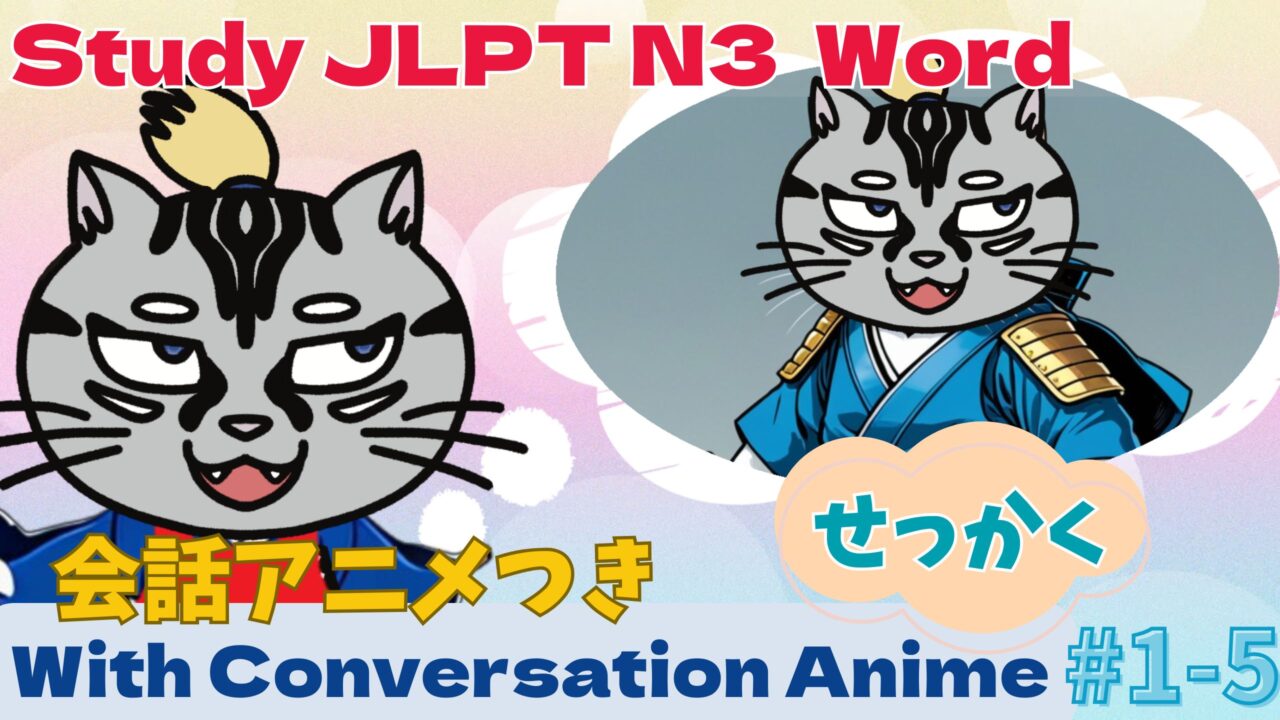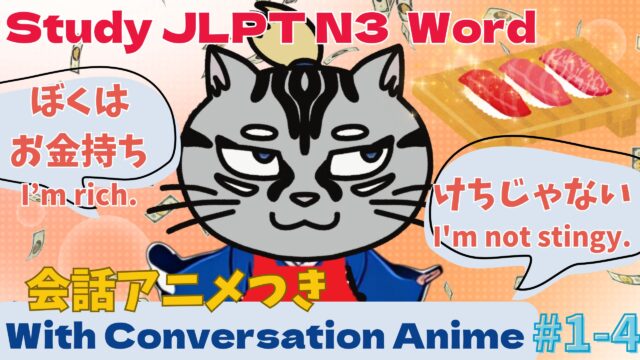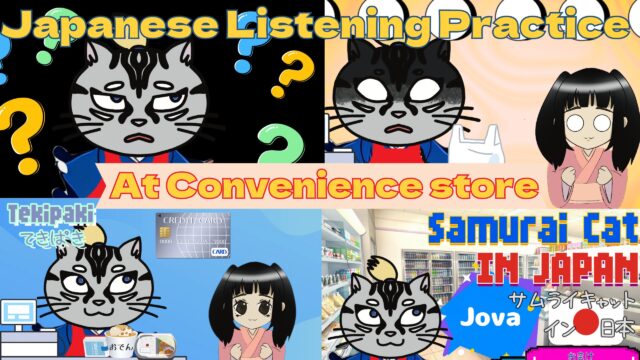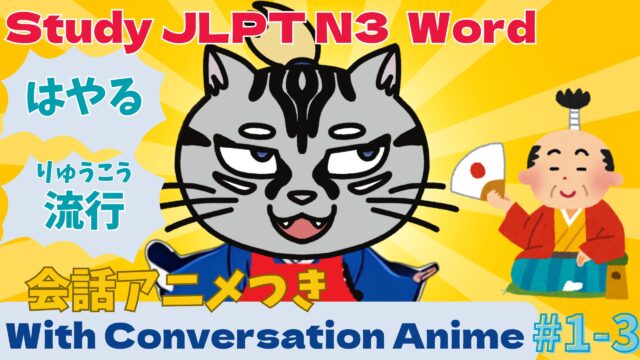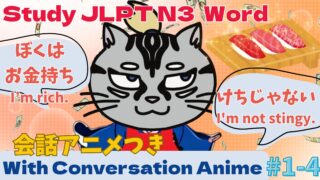ある行為が無駄になる事態に関して、「努力してわざわざ」の意で、それを惜しむ気持ちを表わす語。
たまにしかない機会が無駄になる事態を惜しむ気持ちを表わす。「せっかくの休日に雨が降ってしまった。」
相手の頼みなどを断るときにも用いる。「せっかくですが・・・」
Expressly, Specially
スクリプト|Script
みなさん、こんにちは。日本語(にほんご)教師(きょうし)のココです。
I’m Jova. I am a Japanese learner. I’m a Samurai cat.
私(わたし)はきなこ。ココのアシスタント。よろしくね。
今回(こんかい)は「せっかく」ということばを説明(せつめい)します。
「せっかく」は時間(じかん)、努力(どりょく)、チャンスなどを大事(だいじ)に思(おも)う気持(きも)ちを強(つよ)く言(い)うときに使(つか)います。「せっかくの~(なになに)」「せっかく~(なになに)のに」「せっかく~(なになに)から」という形(かたち)でよく使(つか)って、あることが無駄(むだ)になることを残念(ざんねん)に思(おも)う気持(きも)ちを表(あらわ)します。
It’s hard to translate into English.
このことばは英語(えいご)に訳(やく)すのは難(むずか)しい。
例(たと)えば、家族(かぞく)のためにたくさんおいしい料理(りょうり)を作(つく)りました。とても時間(じかん)がかかりました。でも家族(かぞく)はみんなご飯(はん)を食(た)べて帰(かえ)って来(き)て、誰(だれ)も食(た)べません。せっかくおいしいご飯(はん)を作(つく)ったのに、誰(だれ)も食(た)べてくれなくて、残念(ざんねん)です。
初(はじ)めて京都(きょうと)へ旅行(りょこう)に来(き)ました。ずっと楽(たの)しみにしていた旅行(りょこう)です。京都(きょうと)といえば、お寺(てら)や神社(じんじゃ)などの古(ふる)い建物(たてもの)ですよね。せっかく京都(きょうと)に来(き)たから、お寺(てら)や神社(じんじゃ)にたくさん行(い)きます。観光(かんこう)が終(お)わって、そろそろ夜(よる)ご飯(はん)の時間(じかん)です。実(じつ)は今(いま)ハンバーガーが食(た)べたい気分(きぶん)です。
Let’s go to McDonald’s.
マックに行(い)こう~。
せっかく京都(きょうと)にいるのに、ハンバーガーを食(た)べたらちょっともったいない気(き)がします。せっかく京都(きょうと)にいるので、京都(きょうと)の名物(めいぶつ)を食(た)べます。
例文(れいぶん)です。
せっかく富士山(ふじさん)を見(み)に来(き)たのに、曇(くも)っていて見(み)えない。
せっかく大阪(おおさか)に来(き)たから、大阪(おおさか)の有名(ゆうめい)な食(た)べ物(もの)が食(た)べたい。
せっかくの日本(にほん)旅行(りょこう)だから、たくさんの観光地(かんこうち)に行(い)って、日本(にほん)の食(た)べ物(もの)を食(た)べて、日本(にほん)の人(ひと)とたくさん話(はな)して、旅行(りょこう)を楽(たの)しもう。
会話|Conversation
では、日本語(にほんご)を勉強(べんきょう)しているサムライキャット、ジョバの会話(かいわ)を見(み)てみましょう。ジョバは日本(にほん)に留学中(りゅうがくちゅう)で、コンビニでバイトをしていますが、今日(きょう)はバイトは休(やす)みで家(いえ)にいます。ジョバの日本語(にほんご)は中級(ちゅうきゅう)レベルです。
Let’s take a look at a conversation between Jova, a samurai cat studying Japanese. He is studies in Japan and works part-time at a convenience store, but today his part-time job is off and he is at home. His Japanese is at an intermediate level.
あ、店長(てんちょう)から電話(でんわ)だ。何(なん)だろ。もしもし。ジョバです。
Oh, the manager’s on the phone. What is it? Hello. This is Jova.
ジョバさん、休(やす)みの日(ひ)にごめん。実(じつ)は秋坂(あきさか)さんが今日(きょう)急(きゅう)に来(こ)られなくなって、困(こま)ってるんだ。ジョバさん、今(いま)から来(こ)られる・・・?
Hi, Jova. Sorry to bother you on your day off. Actually, Akisaka-san suddenly couldn’t come today, so I’m in a bit of a bind. Jova-san, can you come now…?
はい。大丈夫(だいじょうぶ)です。
Yes, I can.
ありがとう~!助(たす)かるよ。
Really? Thanks.
いえ。大丈夫(だいじょうぶ)です。ではすぐ行(い)きます。失礼(しつれい)します。
No problem. I’m going now.
よろしく。
Thank you.
店長(てんちょう)、お疲(つか)れ様(さま)です。
Manager, Otsukare sama desu.
ジョバさん、来(き)てくれてありがとう。今日(きょう)は日曜日(にちようび)だから、日本語(にほんご)学校(がっこう)も休(やす)みだよね。せっかくの休(やす)みにごめんね。
Thank you for coming. It is Sunday today, so the Japanese language school is off, right? Sorry for the holiday.
いえ。大丈夫(だいじょうぶ)です。家(いえ)で日本語(にほんご)の勉強(べんきょう)してただけなので。(ほんとはアニメ見(み)てただけ。)
I’m fine. I’ve just studied Japanese at home. (Actually, I was just watching Anime.)
次(つぎ)の日(ひ)|The next day
秋坂(あきさか)さん、お疲(つか)れ~。
Akisaka-san, Otuskare.
ジョバ君(くん)、昨日(きのう)私(わたし)の代(か)わりにバイト出(で)てくれたんでしょ。ありがとう。助(たす)かったよ。
Jova-kun, thanks for taking my place yesterday. You’ve been a big help.
せっかくの休(やす)みだったのにな~。せっかく天気(てんき)もよかったのにな~。
It was a great day off. The weather was so nice.
ごめんね。せっかくの休(やす)みに。
Sorry. I’m sorry for your day-off.
あれ?秋坂(あきさか)さん、なんか目(め)が赤(あか)くない?なんかあったの?
Akisaka-san, your eyes aren’t red? Something happened to you?
実(じつ)は彼氏(かれし)に振(ふ)られたの・・・
Actually, my boyfriend dumped me…
振(ふ)られたって何(なに)?
What is “furareta”?
別(わか)れようって言(い)われたの・・・
My boyfriend said to me to break up.
え?!?!(秋坂(あきさか)さんに別(わか)れようなんて!!)
What?! (He said to Akisaka-san to break up?!)
それで涙(なみだ)が止(と)まらなくて、どうしてもバイト行(い)けなかったの。
I couldn’t stop crying, and I just couldn’t go to my part-time job.
そうなんだ・・・大変(たいへん)だったね。
I see. It must be tough.
でももう大丈夫(だいじょうぶ)!私(わたし)も最近(さいきん)彼氏(かれし)のことあんまり好(す)きじゃなくなってたし。
But I’m okay now! I didn’t really like him much anymore either.
昨日(きのう)のバイトのお礼(れい)にご飯(はん)おごるよ。
I treat you dinner for yesterday.
ほんと?!2人(ふたり)でなんか食(た)べに行(い)くってこと?!
Really?! Are we going out to eat?
うん。何(なに)が食(た)べたい?
Yes, what do you wanna eat?
じゃ、お寿司(すし)がいいな。
I want to eat sushi.
回転寿司(かいてんずし)でいいよね?
Is conveyor belt sushi okay?
うん!回転寿司(かいてんずし)、大好(だいす)き!
Sure! I love them.
じゃ、そうしよう。今日(きょう)バイトのあと行(い)く?暇(ひま)?
Then let’s go there. How about today after job? Do you have time?
うん!暇(ひま)。行(い)こう。
Yes! Let’s go.
(やった~!秋坂(あきさか)さんとお寿司(すし)デート?!?!うれしい!)
Wow. I’m going to eat sushi with Akisaka-san. Happy
(せっかく秋坂(あきさか)さんと出(で)かけるから、おしゃれしたいな・・・)
秋坂(あきさか)さん、バイト終(お)わったら僕(ぼく)もっとかっこいいサムライの服(ふく)に着替(きが)えてくるから、ちょっと待(ま)っててくれる?
(Since I’m going out with her, I want to dress up…)
Akisaka-san, I’m going to change into a cooler samurai outfit after I finish my part-time job, so will you wait for me?
え・・・?服(ふく)はそのままでいいよ・・・
What? You don’t have to change your clohth.
(楽(たの)しみー!)
Excited!
秋坂(あきさか)さんと初(はじ)めて出(で)かけます。よかったね。ジョバ。
He is going to go out with Akisaka-san for the first time. Good for him.
英語スクリプト|Script in English
Hi, everyone. I am Coco, a Japanese teacher.
I’m Jova. I am a Japanese learner. I’m a Samurai cat.
僕はジョバ。日本語を勉強しているよ。侍キャットだぜ。
I’m Kinaco, Coco’s assistant. Nice to meet you.
I will explain the word “sekkaku”.
The word “sekkaku” is used to express a strong feeling of valuing time, effort, or opportunity. It is often used in the form of “sekkaku no ~”, “sekkaku ~no ni”, or “sekkaku ~kara” to express regret that something is going to waste.
It’s hard to translate into English.
For example, I cooked many delicious dishes for my family. It took me a lot of time. However, everyone in my family came home after eating and no one ate. It is a pity that no one eats the delicious food I cooked for them.
This is my first trip to Kyoto. I had been looking forward to this trip for a long time. Kyoto is all about old buildings such as temples and shrines. Since I have come all the way to Kyoto, I will visit many temples and shrines. After all the sightseeing, it is time for dinner. Actually, I am in the mood for a hamburger right now.
Let’s go to McDonald’s.
Let’s go to McDonald’s.
Since I am in Kyoto, I feel it would be a bit of a waste if I ate a hamburger. Since we are in Kyoto, I will eat Kyoto’s specialties.
Here are example sentences.
I came all the way to see Mt. Fuji, but I can’t see it because it’s cloudy.
Since I have come all the way to Osaka, I want to eat Osaka’s famous food.
Since I have come all the way to Japan, I want to visit many sightseeing spots, eat Japanese food, talk with many Japanese people, and enjoy my trip.
ことば|Word
- 観光/かんこう|Sightseeing
- 気分/きぶん|Feeling
- もったいない|Wasteful
- 名物/めいぶつ|Specialty
- 観光地/かんこうち|Sightseeing area
- 振る/ふる|Turn down, Dump, Shake
- おごる|Treat
- 回転(する)/かいてん|Rotate(※回転寿司…Converyor-belt sushi )
- おしゃれ(する)|Fashionable

